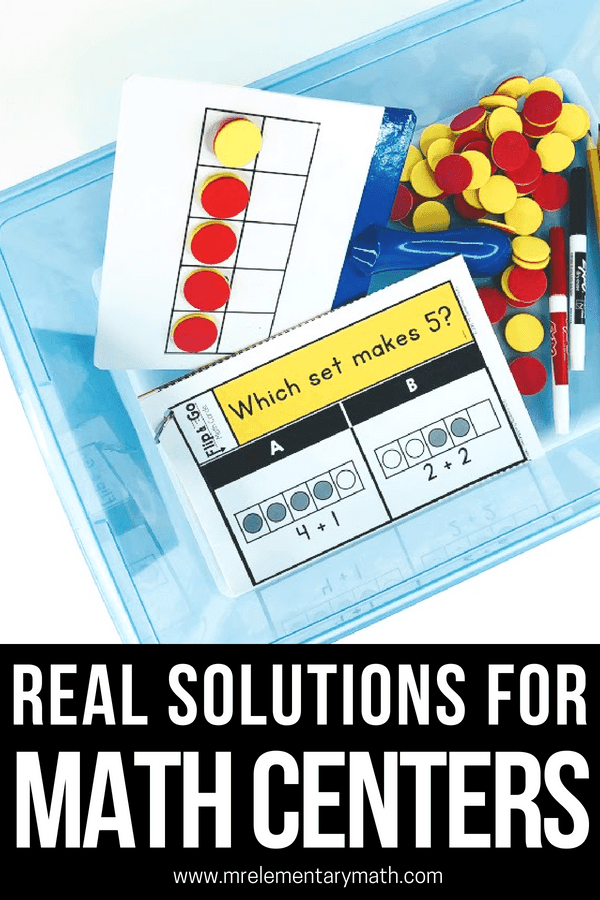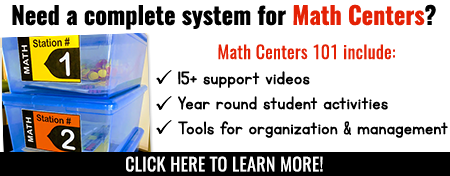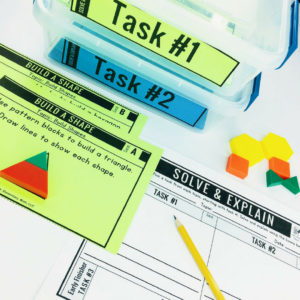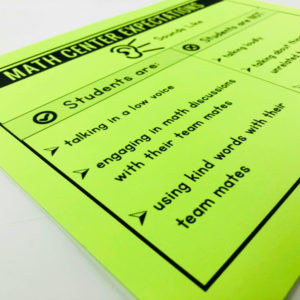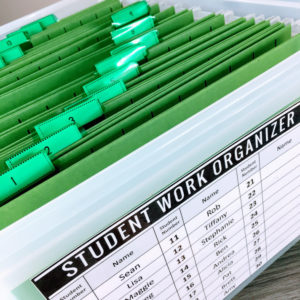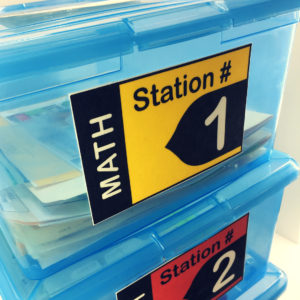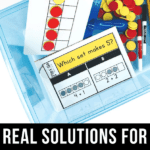
There are numerous benefits to doing math centers, but let’s be honest. There are times when things go off the rails. Been there!
These math center ideas will help you get your math centers back on track.
Problem: Off Task Students
My kids are not on task. They’re doing everything except the work at their centers.
Possible Reasons:
- The activity is not on the child’s level
- For whatever the reason, students don’t know what to do

Solutions:
1. Make sure your students are doing work that is on their level. Remember centers are a time to review what has already been taught. They should not be working on any new concepts unless they are at the teacher led center with you.
2. Communicate clear directions so students know what is expected of them. Eliminate any confusion with photo directions. They work like a charm for all grade levels, not just kindergarten.
3. Model what your students should be doing before sending them off to centers. It takes more than one time for kids to become independent. When you notice off-task behavior, practice again.
4. Provide recording sheets to go along with each math center so that there is a level of accountability.
5. Establish an explicit behavior management system that outlines roles and responsibilities for individual students AND teams.
Problem: Early Finishers
I have students that interrupt me during my teacher led small group to tell me “I’m finished.”
Possible Reasons:
- The time kids are in centers is too long
- The task may be too easy
- Some kids are just quicker
Solutions:
1. Make each rotation 15-20 minutes long
2. Provide clear directions to let your kids know what to do when they complete a task (i.e. playing again, math journal prompts, reflection questions)
3. Create an anchor chart with things that early finishers should do next
4. Give students activities and games that can either be played again or have enough questions/tasks that it’s impossible to complete within 15-20 minutes
5. Provide recording sheets that students must show you as proof that they are finished (if everything is correct then use data to differentiate)
Problem: Little to No Math Talk
My kids are doing the activities at their math stations, but they are not having meaningful math conversations.
Possible Reasons:
- They may struggle with verbalizing their thoughts
- Students are so focused on “doing the math” they forget to share out
- They aren’t used to regularly sharing their thoughts with their classmates

Solutions:
1. Set clear expectations at the beginning about math talk during center time
2. Model how this looks by practicing in front of the whole group with a student
3. Include sentence frames and/or vocabulary cards at their workstations as a scaffold
4. Provide simple child-friendly directions to remind students to talk with partner(s)
5. Sprinkle opportunities throughout the school day (morning meeting, literacy centers, STEM, etc.) for your kids to explain their thinking, so it’s not seen as a something new
Problem: No Time
There is just not enough time to do this. I can’t get in all my rotations.
Possible Reasons:
- Time gets lost in transitions and clean up
- Your school’s mandated math block is very limited
Solutions:
1. Transitions (whole group instruction to center time, rotations, clean up, etc.) should take less than a minute. Time each one to see how long it takes. You may be surprised. If transitions are taking longer than a minute, model and practice them again with your students using a timer.
2. Advocate for a longer math block. Kids need more than 45 minutes in their daily schedule for math. To help, come prepared with solid reasons why you need a longer math block and write out an updated schedule.
Problem: Clean Up Time Takes too Long
It takes FOREVER for my kids to clean up and there are always missing pieces.
Possible Reasons:
- Unclear system for where to store materials
- Students end up arguing over clean up duties

Solutions:
1. Clear storage bins are your best friends. Store everything your students need for their stations inside a see-through lidded container. To make clean up even easier, use labeled ziplock bags for smaller items (i.e. game pieces, manipulatives, etc.) and drop them inside the math bins.
2. Assign one student per group to be the point person for cleaning up. This prevents unnecessary arguments.
3. Just like any other classroom procedure, if you notice that your kids need a refresher it’s time to model again and then practice, practice, practice. It’s always a good idea to provide time after practicing for a quick group discussion about how they did.
When you’re first starting out, things may not go as expected. But never fear, these center tips will get you headed down the right path again.
Enjoyed reading this post? Start from the beginning of this 5 part series on Math Centers.
If you’re looking for a ready made system for math centers + engaging grade level games, check out my course Math Centers 101.
151
